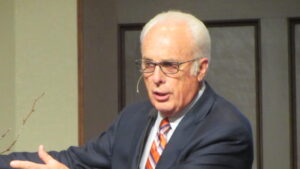In an old British comedy sketch, a German soldier turns to another and asks, “Are we the baddies?”[1]
While humorous, the underlying situation is weighty and near. Might we, without knowing it, be on the side of evil rather than good?
We need to ask ourselves, “Are we the idols?”
I do not mean asking if we are like the singers on American Idol or the trophies on Survivor. Since there is overlap between being an idol and image, let’s start there. Can we function like idols in how we image God? And can we go even further, transforming into an idol?
Are We Imaging God?
Surprisingly, we ought to function like idols. Kelly Kapic, in his chapter in Reformed Dogmatics, says that all humanity was created to “function like ‘idols’ of God himself, that is, to cause those who see and dwell with humans to have a vision of the Creator King.”[2]
What does he mean by this?
Scholars have found evidence that small carved images (like miniature statues) were placed in various places to represent a king’s rule in that area. When people asked, “Who’s in charge of this city?” The answer would be found in the idol’s image. Did the idol look like a certain king or deity? There’s your answer. Look to the idol to discover the king.
Kapic is rightly arguing that humanity functions like idols of the true and living God; we image God (yes, image as a verb). We are both created in the image of God and we ought to function as a display of him.
That said, Scripture never tells us to be God’s idols, only God’s images. In our English language, idol is a slur word. Given this, it’s misleading to say we should be idols of God.
We can function like idols, not as idols of God. Our design is to reflect God, to reflect his light as a lamppost on a hill. We can only do this through union with Jesus Christ. His grace makes us shine brighter than we are, through his holy light! On our own, we risk becoming the image of worthless idols.
Are We Imaging Dust?
Across Scripture, idols are mocked. They are said to be nothing but carved wood or molded metal, made by human hands, and even, according to the sense of one of the Hebrew words for idols, gillulim, they are “dung pellets.”
Across the Scriptures, idols are lifeless: “they have ears but do not hear, eyes but do not see,” and so on (see Psalm 115:4-7).
As we image what we worship, we become like it. If you image God, you become more like him, including his radiance and holiness. Think of Moses’ shining face (Ex. 34:29–35). Moses was transfigured through an encounter with God, imaging God to the people.
As Greg Beale has pointed out, we become like what we worship for our restoration or ruin. Those who worship Christ are being conformed and transformed into his image, “from one degree of glory to another” (2 Cor. 3:18). The only other option is the way to destruction. Scripture contains not only a promise of glorification for those who glorify God, but degradation for those who trust in counterfeit deities.
In critiquing idols, the psalmist says: “Those who make them become like them; so do all who trust in them” (Psalm 115:8).
It is strange to become an idol, isn’t it? It’s hard to wrap your mind around. Yet every day, people are morphing into something like mud. Instead of functioning as images of God, they worship idols and turn into lifeless dust.
Life goes wrong when we don’t worship right.
Who Do You Worship? Who Will You Be Like?
In Calvin’s Institutes, as he unpacks the first of the Ten Commandments, he helps us to identify idolatry by outlining four things we owe to God alone. They are: (1) adoration (2) trust, (3) invocation (asking for help), and (4) thanksgiving.[3] God is deserving of our respect, our reliance, and our requests.
One way idolatry occurs is when we trust or rely on anything other than God. When we praise someone more than God, that person becomes an idol. When we go to technology before we go to God in prayer, the tech has become an idol. When we go through hard times and find more rest in our bank account than in God, our money has become an idol.
And as we have seen, worshipping anything other than God results in death as we become what we worship. We grow as directionless as our smartphones, as stiff-necked as our preferred political leaders, as dumb as our money, and as lifeless as a golden calf.
The story of Israel is a people who wrestled with anxiety and fear because they trusted in idols instead of God (Dt. 28:64–68). They became restless because they trusted in changeable objects instead of the never-changing God. They became like their idols.
What about you? Who do you reflect? What are you becoming?
You cannot do it on your own. You cannot do it by yourself. Jesus is the true image of the invisible God. Through faith we are united to him and his church. Collectively, we are no longer dust-bound statues but temples of the Spirit, reflecting the radiance of our King.
Further Reading:
Beale, Gregory. We Become What We Worship: A Biblical Theology of Idolatry. Downers Grove, IL: IVP Academic, 2018.
Calvin, John. Calvin: Institutes of the Christian Religion. Edited by John T. McNeil. The Library of Christian Classics. The Westminster Press, 2024.
Cavanaugh, William. The Uses of Idolatry. New York, NY: Oxford University Press, 2024.
Keller, Timothy. Counterfeit Gods: The Empty Promises of Money, Sex, and Power, and the Only Hope That Matters. New York, NY: Penguin Group Inc., 2009.
Lints, Richard. Identity and Idolatry: The Image of God and Its Inversion. Downers Grove, IL: IVP Academic, 2015.
[1] Mitchell and Webb: “Are we the baddies?” – YouTube clip.
[2] Allen, Michael, and Scott R. Swain, eds. Christian dogmatics: Reformed theology for the church catholic. Baker Academic, 2016 (187-188).
[3] McNeill, John T., ed. Calvin: Institutes of the Christian religion. Westminster John Knox Press, 1960, 608-609.
























